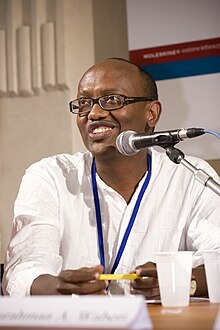Abdourahman Waberi
Abdourahman A. Waberi (born July 20, 1965 in Djibouti City ) is a Djiboutian writer.
Waberi was born in 1965 in what was then French Somaliland and is a member of the Somali ethnic group . In 1977, at the age of twelve, he saw Djibouti gain independence from France. In 1985 he went to France to study English literature at the University of Caen and the University of Burgundy in Dijon . He completed his studies with a thesis on the Somali author Nuruddin Farah , whom he avowedly admired.
In 1994 he published his first short story volume Le Pays sans Ombre , which was awarded the Grand prix de la Nouvelle francophone of the Académie Royale de Langue et de Littérature Française de Belgique and the Prix Albert Bernard of the Académie des Sciences d'Outre-mer de Paris . In 1996 came Cahier Nomade , which received the Grand Prix Littéraire de l'Afrique noire , and in 1997 his first novel, Balbala , was published . These three works form a trilogy about Djibouti and the Horn of Africa region .
L'oeil Nomade, voyage à travers le pays de Djibouti combines texts by Abdourahman Waberi and photographs by John Liebenberg , Pierrot Men and Yves Pitchen from Djibouti. In 2000, after a stay in Rwanda , Waberi published letters from the obligation to remember Moisson de crânes as part of the project . Textes pour le Rwanda ("Skull Harvest"), which deals with the genocide in Rwanda .
More recent works are the short story volume Rift Routes Rails - 13 variations romanesques (2001), the children's book Bouh et la Vache magique (“Bouh and the Zaberkuh”, 2002) and Transit (2003) about the life of an African immigrant in Paris and the topic of War and exile. In 2002 Waberi's first volume of poetry, Les Nomades mes frères, vont boire à la Grande Ourse, was published . His novella “Somali Women of Canada” was part of the anthology “Amazing travelers. New Voices from Africa ”. Most recently, the novel Aux Etats-Unis d'Afrique (2006) came out, which describes the affluent "United States of Africa" in a satirical reversal of today's conditions, which are confronted with immigrants from impoverished and war-torn Europe and North America. This novel was received as a criticism of Europe's immigration policy and global inequalities, and within Africa in particular as a plea for pan-Africanism .
Waberi's works have been translated into English, Italian, Spanish, Portuguese, Serbian and German. The German translation is Die Legende von der Nomadensonne (a compilation of short stories from Le Pays sans Ombre and Cahier Nomade , ISBN 3-927527-81-5 ), Skull Harvest and In the United States of Africa ( ISBN 978-3-89401-563 -3 ).
Waberi lives as an English teacher in Caen and is also active as a literary critic , literary consultant for the Parisian publishing house Serpent à Plumes for African literature and a collaborator for Le Monde diplomatique . In 2006/2006 he stayed in Berlin as a guest of the DAAD .
Works
- Djibouti trilogy
- 1994 Le pays sans ombre / Le serpent à plumes / 178 pages / ISBN 978-2-90895-731-0 (Taschenbuch / Poche / 2000). STORIES
- 1996 Cahier Nomade / Le serpent à plumes / 153 pages / ISBN 978-2-90895-784-6 (Taschenbuch / Poche / 1999). STORIES
- 1997 Balbala / Le serpent à plumes / 187 pages / ISBN 978-2-84261-030-2 (Paperback / Folio / 2002). NOVEL
- Second trilogy
- 2000 Moisson de crânes / German skull harvest / Trier: Litradukt 2008/74 pages / ISBN 978-3-940435-03-3 (paperback). TEXTS
- 2001 Rift Routes Rails / Gallimard / 96 pages / ISBN 978-2-0707-6023-7 . VARIATIONS
- 2003 Transit / Gallimard / 154 pages / ISBN 978-2-0707-6874-5 . NOVEL
- Third trilogy
- 2006 Aux États-Unis d'Afrique.
- Übers. Katja Meintel: In the United States of Africa. Nautilus, Hamburg 2007 ISBN 978-3-89401-563-3
- 2009 passage of the noise.
- Übers. Katja Meintel: Gate of Tears. Nautilus, Hamburg 2010 ISBN 978-3-89401-734-7
Web links
- Literature by and about Abdourahman Waberi in the catalog of the German National Library
- Waberi at the Columbian College of Arts and Sciences, Washington DC, Department of Romance, German and Slavic Languages and Literatures. Catalog raisonné
- Portrait of the Djiboutian writer Abdourahman A. Waberi on marabout.de
- Charles Forsdick , French professor at the University of Liverpool , in an interview with Alain Mabanckou and Waberi about the Manifesto for a "World Literature in French" 2007 (in English).
Individual evidence
- ↑ Publishing program. Abdourahman A. Waberi. In: litradukt. Literature editions Manuela Zeilinger-Trier, accessed on January 5, 2014 .
- ↑ The translation was awarded the Stefan George Prize . This prize, donated by the Conseil international de la langue française and endowed with 2,500 euros, is intended to promote young translators and to contribute to the spread of Francophone literature in German-speaking countries. The jury and the award ceremony have their place at Heinrich Heine University .
| personal data | |
|---|---|
| SURNAME | Waberi, Abdourahman |
| ALTERNATIVE NAMES | Waberi, Abdourahman A. |
| BRIEF DESCRIPTION | Djiboutian writer |
| DATE OF BIRTH | July 20, 1965 |
| PLACE OF BIRTH | Djibouti city |
